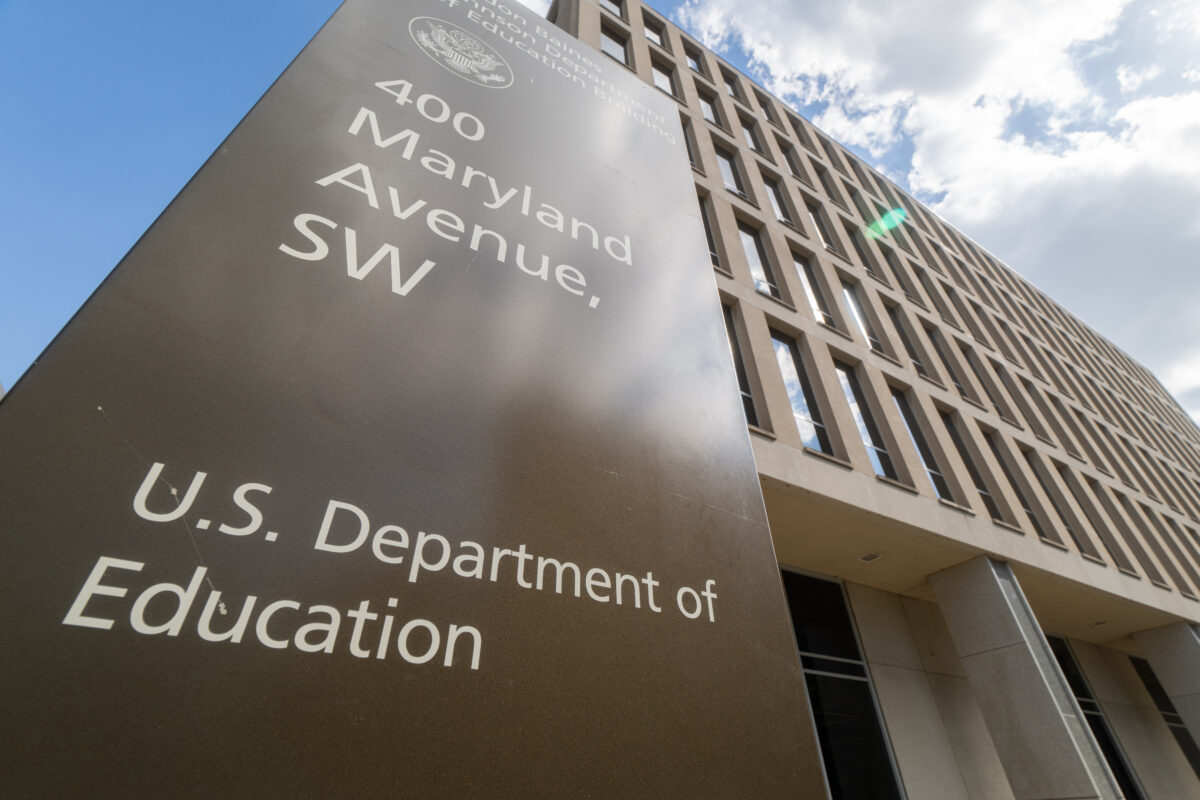
www.dailywire.com
Here’s What Getting Rid Of The Education Department Could Look Like
As we prepare to enter the new year, we’re taking you back to some of The Daily Wire’s best reporting from 2024. This article was originally published on November 30.
President-elect Donald Trump has promised to eliminate the Department of Education, an ambitious goal that comes amid backlash to what critics say is the agency’s runaway spending and focus on “woke” indoctrination as American children’s grades decline.
“I say it all the time, I’m dying to get back to do this. We will ultimately eliminate the federal Department of Education,” Trump said during a September rally in Wisconsin. “We will drain the government education swamp and stop the abuse of your taxpayer dollars to indoctrinate America’s youth with all sorts of things that you don’t want to have our youth hearing.”
The proposal was met with cheers on the campaign trail. But it’s also gotten support from experts like Jim Blew, who served as Assistant Secretary for Planning, Evaluation and Policy Development at the Education Department during Trump’s first term. Blew told The Daily Wire there’s no doubt in his mind that his former workplace should be eliminated.
“All of the Education Department’s core functions could and should be performed by other federal agencies,” Blew, who also co-founded the Defense of Freedom Institute, told The Daily Wire.
Blew’s proposal gets at another major criticism of the Education Department, which is that it doesn’t do much educating. Though it spends $80 billion in taxpayer dollars each year, it has no say over public school curriculum, which is decided at the state and local level. Instead, it doles out $18.4 billion annually for Title I, the low-income school district program, and $15.5 billion for special education. It also enforces certain Title IX civil rights laws and sets the rules for colleges to participate in the $1.6 trillion federal student loan program.
The Trump administration could potentially reassign some programs to other agencies while scrapping others. For example, some critics have proposed assigning the student loan program to the Treasury Department, having the Justice Department enforce Title IX, and turning Title I into a state block grant program with minimal federal oversight.
But Blew acknowledged that one way of doing this — no-strings-attached block education grants to local governments — could result in worse spending decisions.
“But they would be hard pressed to do worse than the current system,” he said. “We’re betting that the local districts understand their communities better than people in D.C., that they know their students’ needs best, and that they can use the money more effectively.”
During the pandemic, even the hundreds of billions of extra COVID dollars the department doled out were not enough to keep children from failing academically. Students nationwide fell hopelessly behind in core subjects — nine-year-olds saw their average reading scores fall five points in 2022, the largest decline since 1990, and their math scores fell seven points, the first ever decline in math.
Parents lashed out at schools that kept depressed children stuck at home, struggling to learn through a laptop screen, then forced them to mask and social distance all day when they did return to the classroom. At the same time, remote learning allowed parents to catch a glimpse of the “woke” material their kids were learning.
Trump is not the first Republican to try to abolish the Education Department. Ronald Reagan also campaigned on getting rid of it, but he was met with resistance from Congress and backed down. However, the current frustration with public schools could be the tipping point Trump needs to nix the department.
The Education Department is also responsible for enforcing certain civil rights laws, a mandate the Biden administration has taken full advantage of with a dramatic rewrite of Title IX guidance, which redefined sex to include “gender identity,” erasing protections for biological women in schools. The new interpretation has garnered significant backlash and it has been blocked by the courts in many states.
Trump has expressed his intention to use federal leverage on education as well, including cutting funds for schools pushing Critical Race Theory, gender ideology, or “other inappropriate racial, sexual, or political content on our children.”
Jonathan Zachreson, a conservative on the Roseville City School Board near Sacramento, said that while he agrees with slashing federal bureaucracy, the Trump administration could also use the department to reign in California’s far-left education policies.
Zachreson cited California’s recent legislation forcing schools to allow trans-identifying students to use the bathroom of the opposite sex as well as prohibiting schools from having parental notification policies.
“I believe both of those things are a violation of federal law, but if you get rid of the Department of Education how are you to hold California and some of these very leftist states accountable? So that’s my biggest concern,” Zachreson told The Daily Wire.
“Before you abolish the Department of Education, I think you need to fix a couple of things,” Zachreson said, including making Title IX guidance “very clear.”
Andy Smarick, an education expert and senior fellow at the Manhattan Institute, agreed that without a federal bureaucracy, Trump and future presidents would have less power to drive their education agenda.
“I’m fine with allowing state leaders to do more. But Mr. Trump and future presidents may like the idea of having federal power to advance their priorities,” Smarick said.
“Federal rules unquestionably create burdens for school leaders and can create headaches for state and local policymakers,” Smarick said, but he cautioned, “If we get rid of the Department of Education, we have to be comfortable with the idea of lots of federal money and reduced oversight.”
Federal funding is not always a positive, though, Zachreson observed. California’s teachers’ unions “held kids hostage” during the pandemic by refusing to open schools until the Education Department gave them federal COVID relief money, he said.
In order to eliminate the Department of Education, Trump will need to clear a couple of hurdles, first and foremost, getting Congress to agree to shutter the department. Trump would have to convince the slim Republican majorities in the House and Senate to pass legislation to close the department, and some experts have cast doubt on whether he will be able to do so since he needs a supermajority of 60 votes in the Senate.
Already though, Republican lawmakers are making moves. Senator Mike Rounds (R-SD) introduced a bill last week that would abolish the Education Department and transfer its programs to other federal agencies.
And then there are teachers’ unions. Teachers’ unions and the department have always been linked. When President Jimmy Carter signed legislation creating the Cabinet agency in 1979, he was fulfilling a campaign promise to the National Education Association. And teachers’ unions still very much want the department around. This month, Randi Weingarten, the head of the country’s biggest teachers’ union slammed Trump’s plans to close it.
Whatever the Trump administration is able to accomplish, it will take years to reverse the learning loss students have suffered recently. Blew, the former Education Department official, lamented that so many children are underserved by the current education system.
“The reform movement will continue until that injustice is erased,” he said.














